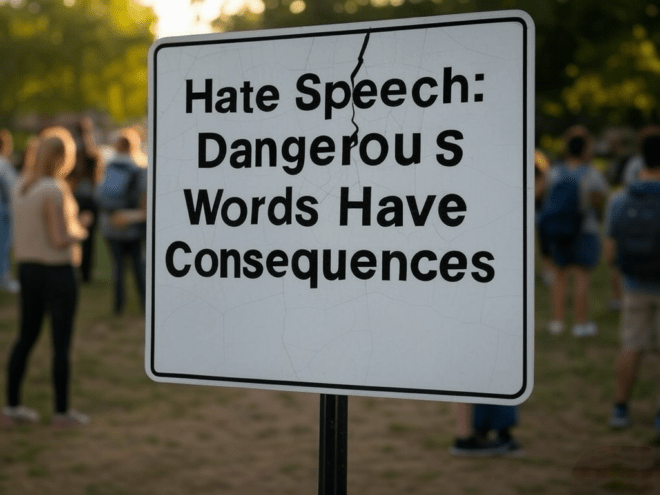
Abstract
Hate speech is an increasingly pervasive phenomenon in contemporary society, particularly exacerbated by the rise of digital communication platforms. This paper provides a comprehensive analysis of hate speech, examining its definitions, societal impacts, psychological consequences, implications for democracy, and responses within the digital age. By employing a multidisciplinary approach, this study underscores the urgency of addressing hate speech while balancing the tenets of free expression. Through an exploration of various perspectives, this paper aims to foster a nuanced understanding of hate speech and its ramifications, ultimately advocating for informed strategies to combat its detrimental effects.
Introduction
Hate speech, defined as any form of communication that demeans, discriminates against, or incites violence towards individuals or groups based on characteristics such as race, ethnicity, religion, gender, sexual orientation, or disability, has become a critical issue in both public discourse and academic inquiry. While freedom of expression remains a fundamental principle in democratic societies, the misuse of this right through hate speech poses significant threats to social cohesion, individual well-being, and the integrity of democratic institutions. This paper explores the multifaceted impacts of hate speech, emphasising the necessity for a balanced approach that addresses its dangers while respecting free expression.
Understanding Hate Speech
Defining Hate Speech
Hate speech encompasses a wide range of expressions that can vary significantly in form and intensity. It includes overtly aggressive statements, derogatory slurs, and more subtle forms of dehumanisation. The definition of hate speech is often contested, with different legal and cultural interpretations across societies. For instance, while some countries have stringent laws against hate speech, others prioritise free speech, leading to a complex landscape of regulation and social norms.
Cultural and Contextual Variations
The understanding and implications of hate speech are deeply influenced by cultural contexts. In societies with a history of systemic discrimination, such as the United States or South Africa, hate speech is often viewed as a direct threat to social justice and equality. Conversely, in countries with more lenient free speech laws, such as the United Kingdom, the focus may be on individual rights rather than collective harm. This paper will analyze case studies from various jurisdictions to illustrate these differences and their implications for societal attitudes towards hate speech.
Societal Impact
Normalisation of Discrimination
Hate speech normalises discriminatory attitudes and behaviours, fostering an environment where hostility and division can thrive. Historical examples, such as the genocidal propaganda in Rwanda, demonstrate how hate speech can escalate into violence and societal polarisation. Contemporary case studies, including the rise of far-right movements in Europe and the United States, further illustrate the corrosive effects of hate speech on social cohesion. The normalisation of hate speech contributes to an atmosphere of fear and mistrust among communities, undermining the foundational principles of democracy and equality.
Erosion of Social Cohesion
The societal ramifications of hate speech extend beyond individual incidents, leading to a broader erosion of social cohesion. When hate speech proliferates, it creates an environment where marginalised groups feel threatened and devalued. This erosion manifests in tangible ways, such as increased instances of violence, discrimination, and social fragmentation. The paper will examine statistical evidence linking hate speech to rising hate crimes, demonstrating the urgent need for effective intervention.
Psychological Consequences
Impact on Victims
The psychological effects of hate speech are profound and far-reaching. Victims of hate speech often experience trauma, anxiety, depression, and diminished self-worth. Research indicates that individuals targeted by hate speech may suffer from long-term psychological consequences, including post-traumatic stress disorder (PTSD) and a pervasive sense of fear. The dehumanisation that accompanies hate speech perpetuates harmful stereotypes, leading to a cycle of prejudice and discrimination.
Broader Emotional and Cognitive Effects
The psychological toll of hate speech extends beyond the immediate victims. Perpetrators and bystanders may also experience emotional and cognitive consequences, creating a toxic environment that harms all involved. Studies have shown that exposure to hate speech can desensitise individuals to violence and increase aggressive behavior. This section will explore the interplay between hate speech, social psychology, and collective trauma, emphasising the need for comprehensive mental health support for affected individuals.
Implications for Democracy
Threats to Political Discourse
In democratic governance, hate speech poses unique challenges to the integrity of political discourse and civic engagement. The proliferation of hate speech undermines trust in institutions and fosters an atmosphere of suspicion and hostility. Political rhetoric that employs hate speech can polarise communities, hindering constructive dialogue and collaboration. This paper will analyse the implications of hate speech for democratic processes, including voter turnout, political participation, and public trust in government.
Balancing Free Expression and Protection from Harm
The regulation of hate speech raises complex questions about balancing the protection of citizens from harm with the safeguarding of free expression. Legal frameworks for addressing hate speech vary widely, with some countries prioritising censorship while others emphasise counter-speech and dialogue. This section will explore the ongoing debates surrounding hate speech regulation, highlighting the importance of navigating this delicate balance through informed and nuanced approaches.
The Digital Age
Amplification of Hate Speech
The rise of social media has significantly amplified the reach and impact of hate speech. Digital platforms can act as echo chambers, where hate speech spreads rapidly and unchallenged. The challenges of moderating and enforcing policies against hate speech in a globalised digital landscape are formidable. This paper will examine the role of social media companies in addressing hate speech, the effectiveness of their policies, and the implications for user safety and free expression.
Case Studies of Online Hate Speech
Contemporary examples of online hate speech, such as the Christchurch shooting and the role of social media in fueling hate groups, illustrate the urgent need for effective intervention. This section will analyze the responses of digital platforms to these incidents, evaluating the effectiveness of their strategies in combating hate speech while preserving user rights.
Legal and Policy Responses
International Human Rights Frameworks
Effective responses to hate speech must be grounded in international human rights frameworks and informed by national laws. This paper will discuss the effectiveness of various legal approaches to hate speech regulation, including criminalisation, civil liability, and administrative measures. The ongoing debate between censorship and counter-speech will be explored, emphasising the need for a balanced perspective that recognises the necessity of regulation while promoting dialogue and understanding.
Best Practices for Policy Implementation
Drawing from successful case studies, this section will outline best practices for implementing hate speech policies. Strategies may include public awareness campaigns, community engagement initiatives, and educational programs aimed at fostering empathy and understanding. The importance of collaboration between governments, civil society, and digital platforms will also be emphasised.
Strategies for Combating Hate Speech
Education and Awareness Campaigns
Combating hate speech requires a multifaceted approach that includes education and awareness campaigns. These initiatives play a crucial role in fostering empathy and understanding, empowering individuals to challenge hate speech and misinformation. This paper will explore successful educational programs that have effectively reduced hate speech and promoted inclusivity.
Promoting Media Literacy and Critical Thinking
Promoting media literacy and critical thinking skills is essential for empowering individuals to navigate the complexities of digital communication. This section will discuss the importance of equipping individuals with the tools to critically evaluate information and engage constructively in discussions about hate speech.
Community-Based Initiatives and Restorative Justice
Community-based initiatives and restorative justice approaches offer promising avenues for healing and reconciliation. This paper will examine successful examples of community-led efforts to combat hate speech and foster dialogue among diverse groups, highlighting the potential for grassroots movements to effect change.
Conclusion
The dangers of hate speech are urgent and multifaceted, necessitating a comprehensive and balanced approach to address its root causes while upholding the principles of free expression and human rights. The role of individuals, communities, and institutions is paramount in fostering a culture of respect and inclusion. As we confront this pervasive issue, it is essential to engage in informed dialogue and collaborative action.
In closing, this paper serves as a call to action for all stakeholders to engage in the fight against hate speech. By understanding its implications and working together, we can create a more equitable and just society, free from the shackles of hate.




What Nigeria is doing is not good.
Help Stop Hate?